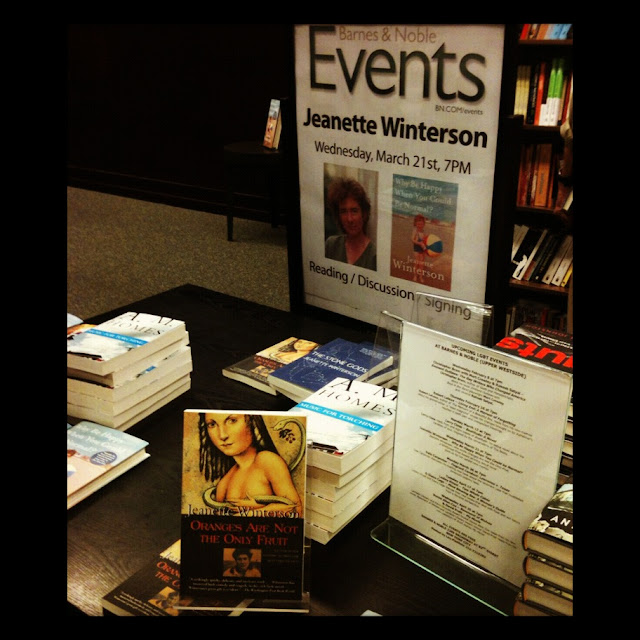How amazing is it that I met Gloria Steinem and Jeanette Winterson in the same week? I love NYC. My sister introduced me to Winterson's work fourteen years ago, passing on to me her copy of Written on the Body. Quite possibly it remains my favorite of Winterson's novels, although I don't really believe in having favorites. Winterson writes very personal, poetic prose that is erupting with passion and energy. She plays with narrative structures, and combines myth, history, and fiction. It is her distinctive style .
Ms. Winterson reminded me very much of one of my theatre instructors in college, Susan Balentine. They have similar hairstyles, mannerisms, speech and breath patterns, and auras. They are also both very small women who exhibit immense intensity. They walk with purpose. And they both look at you intently when they are speaking with you in the way people who are generous with their time and attention do. They both like to laugh and smile, radiating positivity, while simultaneously, and clearly, masking a deep pain. And they both like the stage.
I had to ask Winterson if she was a football fan knowing that she was from Manchester. Her answer was, "No, because then I'd have to support Rooney," which was hilarious, and exactly the type of thing I'd say. I offered that most people born and bred in Manchester actually support City not United, but she didn't seem that interested, until she asked me who I supported and I answered Liverpool. That was a trigger and she let out a playful "grrrrrr." Although ManU and LFC have a legendary rivalry, the cities themselves have a rivalry that goes back to the 1800's. I think this is something ingrained into the hearts and minds of Mancunians and Liverpudlians alike, as mention of their rival cities tend to automatically result in negative reactions. I made sure to end on a good note by telling her that I loved Manchester when I visited, and that aside from producing a great writer, it has produced lots of great bands.
Winterson's new memoir, Why Be Happy When You Could Be Normal?, details the tumultuous upbringing that gave rise to her voice. She was adopted as an infant by a Pentecostal couple who did not allow her to read, and she spent her formative years evangelizing on the streets, and in poverty. At sixteen she left home after being kicked out of the church for falling in love with a woman. She eventually made her way to Oxford University, and then she continued the long journey in search of identity, love, home, and belonging. Here is Jeanette Winterson reading a passage from her new memoir in her mellifluous, Mancunian voice:
Winterson's first novel Oranges Are Not the Only Fruit, was published in 1985 to much acclaim. In 1990, Winterson adapted the autobiographical story into a screenplay, which was produced as a three episode tv series by the BBC. The series stands alone as a strong work, but it does have marked differences from the book, leaving out controversial relationships, as well as difficult to adapt sequences:
"Over the moor, take me to the moor / Dig a shallow grave / And I'll lay me down/ Lesley-Anne, with your pretty white beads / Oh John, you'll never be a man / And you'll never see your home again / Oh Manchester, so much to answer for" --The Smiths, Suffer Little Children





No comments:
Post a Comment